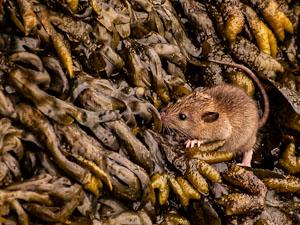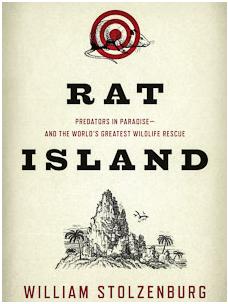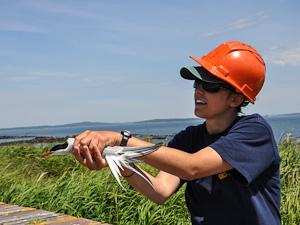

Julia Osterman: Why did you choose to write specifically about island conservation?
William Stolzenburg: There's a long answer and a short answer to that one. The long answer is that I've been doing this beat – wildlife conservation – for about twenty years. There's just a lot of storm and doom out there, and I've reported [on] them all. This struck me as one of the most potentially hopeful campaigns I'd ever come across, so I jumped on it. That's the long story.
The short story was that an old friend I used to work with pitched the idea to me. He was acting director of this organization called Island Conservation, and out of the blue, he called me and said, "You gotta hear this story." Within five minutes, he had me hooked.
The other reason I chose this topic is that I really love seabirds. I am not a scientist, but I am an enthusiast, and I take any opportunity to visit a seabird colony because I find them just one of the most fascinating displays in all of nature. This melded a couple of my favorite things: a solid feel-good story about conservation with some huge implications and the opportunity to explore seabird conservation a little more deeply.
What surprised you most when researching for this book?
Well, it was my own evolution of thought... I come from a conservation writing background, and when I heard about the outcome of some of the rat eradications these conservation practitioners are accomplishing, I thought that this was a no-brainer – a way of preventing endangerment and extinction right now. However, as I got into it, I realized that there is another side to it, and a lot of it does involve eradication, which involves a lot of lives, rats in particular. It was very apparent to me that this wasn't a simple feat, emotionally. These are some very tough decisions that are being made by people who have come to this profession with a love for wildlife, and they have to kill some of the animals they love. As I learned about some of the so-called villains of this story, like the rats, I realized that they're quite admirable animals in their own right.
One particular question that interested me after reading your book was an ethical one: Does one species have more value than another? Why should humans decide which species to protect and which to kill?
Well, in that light, if we're talking about species, they're not really killing either one. They're saving one. They're certainly killing individuals of certain species – the more widespread, ubiquitous species that humans are responsible for introducing to these islands, like rats, cats, mongooses, rabbits, goats and pigs. By killing off these invaders, they're not actually deciding between species. They're deciding for the recovery of one with the control of the other. They're not, in that sense, playing God and deciding that they're going to eliminate an entire species. They are merely eradicating a population of animals from particular places where they've only become problems because of our neglect.

You're sacrificing the lives of some animals for the long-term existence of another, and that implies balance. We're saving a lot more lives overall. For example, if you were to leave these invaders on the islands and not kill them, you've saved their lives, but in the long-run, you're also... killing lots of seabirds. Many more lives are going to be taken in the long run by the continued existence of these invaders. If we go in and remove the invaders now, there will be some short-term deaths, but in the long run, on balance, there will be fewer lives taken and less pain and suffering for all.
In your book, you describe experiments that show rats feel pain – another interesting element when thinking about conservation by eradication or extermination. You also detail how the poison braudifacoum, while it's most likely excruciatingly painful, is also most effective because it's slow-acting and the rats don't suspect it. Do you think humane practices should be sacrificed in order to achieve ends of effective conservation? Do the ends justify the means in this situation?
So far, the philosophy has been pretty much "the ends justify the means," but I hope that's not the long-term solution. They have to use lethal means because there just hasn't been a workable alternative developed yet. For example, if you have tens of thousands of rats on an island, it's going to be next to impossible to trap them all and move them. And if you were to trap them all, where would you move them to? Back to their place of origin? That is just totally unreasonable.
So, right now, I think the conservationists feel like they're up against a wall of time and of technology. They don't have the time to wait until they have the most humane means of righting this problem. These animals that they're trying to save don't have that sort of time. This is an emergency measure, and yes, they're stepping in with perhaps some crude tools – new traps are being developed in places like New Zealand, where the problem has come home to the islanders and civilians are practicing control of some of these animals for the local wildlife. Traps can be used in places where control is the option. They're not pretending that they're going to completely eradicate rats or weasels from the entire main islands of New Zealand; it's a gigantic place. [Their goal is] a continued vigilance against these creatures, so they can use trapping there. Again, it's not the end-all solution because it requires constant vigilance... but it is an alternative to poison, and from what I've seen, some of those traps are very quick and efficient. Death is instantaneous for a large percentage of these animals. However, you need to have people out there doing this all the time. It's a lot of work, and if the resolve ever fails, the whole mission is going to fail because rats and other animals are going to fill the vacuum as soon as people stop caring.

I certainly think there are limits to where we should intervene, although I don't know that we've reached them yet. I think it behooves the conservationists to be sure that the animals they are going after are truly problems, and on the islands, that has been pretty easy to demonstrate. There are some arguments on the mainland about whether or not certain invasive species are as big a threat as they were thought to have been, and those arguments continue. But on the islands, it's evident what tremendous damage, not only decimation but also extinction, can result from some of these animals.
That should never be a blanket endorsement of eradication. I think the message and the objective should be continually questioned, but I certainly don't think they should be shelved for what may be some minor doubts in lieu of some of the consequences for hesitation.
How do you think human perception of our relationships with other species affects conservation?
I think there is very much an emotional side to this issue that goes beyond scientific objectivity, and I think that is okay. Some people have been critical of the emotional aspect, concerned that racism and xenophobia are taking the place of scientific objectivity. Those criticisms should be addressed, but I don't think there is any way you can divorce human emotions from conservation efforts. People have this innate affinity for wildlife, affinity for biological diversity, known as biophilia. There is a natural urge to save this diversity of life, and sometimes making that happen comes with some harsh decisions.
Do you think humans have learned from their past mistakes of introducing species into environments where they end up becoming invasive and decimating native populations?
I think some have, although others may never quite learn. You can see this everywhere, where we try to get the word out, for example, about house pets that are allowed to run free despite all the studies and information we have now that shows that our own house cats in this country are devouring billions of small mammals and birds every year. And there's a certain segment of society out there that denies this science and the associated responsibility. There will always be people who just do not buy into this idea that invasives are bad or that biodiversity is good. That's something we're always going to be dealing with, I'm afraid.

Well, I just mentioned one of them. You can do a lot of things in your own home. This isn't just an island issue; this is an issue worldwide. Show your support by, for example, keeping your housecat indoors. It doesn't necessarily require a college degree to assist in a lot of these efforts right now. I believe that some of the island conservation restoration projects enlist volunteers to do some of the work, and I'm not sure that they all have college degrees or are experts in the field, but they have seen a way they can contribute, even without a degree in conservation.
Will humans ever eradicate all invasive pests from islands or will there always be "Rat Islands?"
I think it's kind of like bailing the leaky boat. As good as we are getting at eradicating some of the most intractable invaders – and rats are among them – there are always going to be rats either hiding on an island or returning to the island, because people will continue traveling to the islands. We are a very cosmopolitan species with machines that take us around, so there will always be stowaways. There will also be people who disagree with our conservation methods and will try to sabotage them. For example, in my book [Rat Island], I note an instance of activists who were spreading antidotes to save the rats on Anacapa despite efforts to eradicate them. But especially on these far remote islands, when you finally remove all of the invaders... it's going to take an extreme act from an invader or a saboteur to begin a reinvasion. That's not the case on the mainland of course, where vacuums created by eradications will be filled with surrounding animals. That's one of the beauties of the islands – that once you've eradicated the animal, you're a big step ahead of the game.
What is the most important idea that people should take away from Rat Island ?
That there's hope, but it comes with a great amount of work behind it. We don't have to surrender to the idea that we're going to lose our biodiversity or that the game of conservation is lost, because with islands we have examples that show how we can make a difference. It's not only a matter of holding the line; in many cases, we're able to take the line back. That's kind of a new idea over the past twenty years of conservation – that we can actually restore or resurrect things. I think that's a very hopeful message, but it also comes with the idea that we have now backed ourselves into this corner whereby it's not going to be easy. There are going to have to be hard decisions. There's a possibility of recovery, but it's going to be a hard one.
Photos are copyright protected and may not be reproduced without permission. Copyright information for photos is as follows: 1) Image of William Stolzenburg is courtesy of William Stolzenburg; 2) A Seattle Rat's Life, used under Flickr Creative Commons Attribution License 2.0 Generic and is courtesy of Ingrid Taylar; 3) Rat Island Cover photo is courtesy of William Stolzenburg; 4) Island Researcher Releasing Tern, photo courtesy of Amanda Boyd and the US Fish and Wildlife Service.